|
|
|
|
|
|
|
|
No Arctic-science events are scheduled today. |
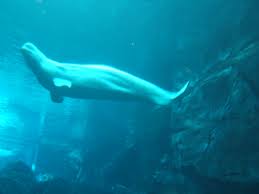 DFO Approves Nunavik's New Three-Year Beluga Management Plan. DFO Approves Nunavik's New Three-Year Beluga Management Plan. The federal government has approved Nunavik's new beluga management plan just in time for this year's harvest season, which opened May 26. The Department of Fisheries and Oceans issued the decision May 15, signing off on a submission made by the Nunavik Marine Region Wildlife Board earlier this year. That was based on months of consultation with Nunavik's 14 hunters' associations and Makivik Corp. Nunatsiaq Online
Arctic Peatlands May Release Potent Greenhouse Gas as Permafrost Thaws. The study by a team of Scandinavian scientists indicated that thawing permafrost could release nitrous oxide (N2O) - also known as 'laughing gas' - under increasing temperatures. Based on an analysis of frozen peat cores exposed to warming conditions in the laboratory, they estimated nitrous oxide emissions could occur from surfaces covering almost one-fourth of the entire Arctic. The highest emissions, from bare peat samples, were on a par with tropical forest soils - the largest known natural source of nitrous oxide - they reported in Proceedings of the National Academy of Sciences. ABC News Researchers Uncover a Cause for Early 20th Century Arctic Warming. Is a warmer Arctic a canary of global warming? Since the 1970s the northern polar region has warmed faster than global averages by a factor or two or more, in a process of 'Arctic amplification' which is linked to a drastic reduction in sea ice. But then how to explain a similar rapid warming that occurred during the early 20th century, when the effects of greenhouse gases were considerably weaker than today? And what can we prove about the period, given the scarcity of usable data and observations prior to the 1950s? Phys.org Canadian Government Invests Over $35M to Preserve Indigenous Languages in the North. The federal government has allocated $19.6 million for the N.W.T. and $15.8 million for Nunavut. The "unprecedented" funding covers the period from 2016 to 2020 and comes from the 2016 federal budget, the office of Canadian Heritage Minister Melanie Joly announced Friday. "There is no relationship more important to our government then the one with Indigenous peoples," Joly said in a statement. "The unprecedented level of support for Indigenous-language services in the Northwest Territories and Nunavut announced today is just one way that our government is living up to this important commitment." RCI Net 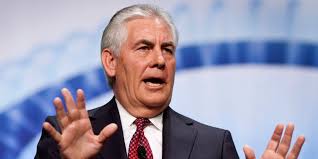 Rex Tillerson Signed a Statement Supporting Arctic Science. Trump's Budget Would Cut It. Rex Tillerson Signed a Statement Supporting Arctic Science. Trump's Budget Would Cut It. The Trump administration's latest budget proposal aims to significantly reduce funding for Arctic climate research, among other environmental programs - a move climate scientists say would be a big mistake. The budget, which was just released by the White House on Tuesday, includes substantial funding reductions for the National Oceanic and Atmospheric Administration. And among these is a $6 million cut to "eliminate Arctic research" at the agency's Office of Oceanic and Atmospheric Research. As the budget itself bluntly states, this move "will terminate improvements to sea ice modeling and predictions that support the safety of fishermen, commercial shippers, cruise ships, and local community stakeholders." The Washington Post 'Brain Drain': Arctic Mayors' List of Concerns Include Exodus of Youths from Towns, Villages. Ask any of the 11 local leaders from around the far north who participated in the recent Arctic Mayors Roundtable about the challenges their communities face, and you'll get a list that, with few exceptions, they all share. "We struggle with the lack of basic infrastructure," says Madeleine Redfern is mayor of Iqaluit, capital of the Canadian territory of Nunavut. "Y'know, telecommunications and the lack of adequate broadband, in particular. Not having any fiber in our region hampers us." KUAC 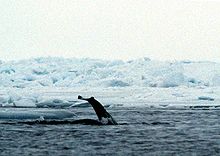 Narwhal Revealing an Arctic Legend. Narwhal Revealing an Arctic Legend. The narwhal, with its unique spiral tusk, has inspired legend in Inuit society and fascinated people across cultures for centuries. This new exhibition will dive deep into the narwhal's Arctic world to explore what makes this mysterious animal and its changing ecosystem so important. Narwhal: Revealing an Arctic Legend will present Inuit perspectives on their connections to narwhals as well as the latest scientific knowledge about these fascinating animals. Through first-hand accounts from scientists and Inuit community members, the exhibition will reveal how traditional knowledge and experience, coupled with scientific research, heighten our understanding of these animals - and our changing global climate. Smithsonian National Museum of Natural History First Nations and Inuit Babies Hospitalized More Often in First Year of Life Compared with Non-Indigenous Babes. First Nations and Inuit babies hospitalized more often in first year of life compared with non-Indigenous babies. First Nations and Inuit babies were hospitalized much more often in the first year of life compared with non-Indigenous babies, many for preventable illnesses, found a new study of infant hospitalizations in Quebec, Canada, published in CMAJ (Canadian Medical Association Journal). The study included 19 770 First Nations babies, 3930 Inuit and 225 380 non-Indigenous infants born between 1996 and 2010 in the province of Quebec. The Arctic Journal Interior Secretary Zinke Focuses on Engergy, Parks During Alaska Visit. Interior Secretary Ryan Zinke is in Alaska for his first visit to the state since his confirmation to the position in March. His first public appearance included a ride to the Alaska Veteran's Memorial on the George Parks Highway with the Alaska Vets Motorcycle Club for their 29th annual Memorial Run. "I think it's important on Memorial Day to recognize why we fight," Zinke said. "There's a kindred spirit among brothers and sisters who have fought and it's great to be in Alaska with them." KTVA
|
|
Future Events
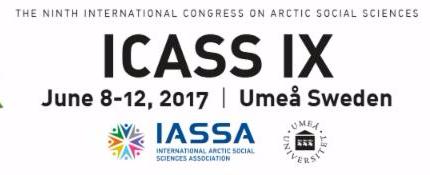 Ninth International Congress of Arctic Social Sciences: People and Places (ICASS IX), June 8-12, 2017 (Umea, Sweden). ICASS IX's theme is People & Place. Research on social sciences and humanities have a great responsibility to address the challenges for sustainable development in the Arctic, with a specific focus on the many different parts of the Arctic and the people that live there. The multiple Arctics have lately been addressed by many policy makers and researchers. The purpose is often to counteract the stereotypic understanding of the Arctic too often represented by icebergs and polar bears. A focus on people and place highlights the many variances across the region in terms of climate, political systems, demography, infrastructure, history, languages, legal systems, land and water resources etc. Ninth International Congress of Arctic Social Sciences: People and Places (ICASS IX), June 8-12, 2017 (Umea, Sweden). ICASS IX's theme is People & Place. Research on social sciences and humanities have a great responsibility to address the challenges for sustainable development in the Arctic, with a specific focus on the many different parts of the Arctic and the people that live there. The multiple Arctics have lately been addressed by many policy makers and researchers. The purpose is often to counteract the stereotypic understanding of the Arctic too often represented by icebergs and polar bears. A focus on people and place highlights the many variances across the region in terms of climate, political systems, demography, infrastructure, history, languages, legal systems, land and water resources etc.
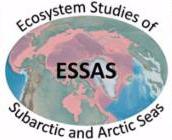 2017 ESSAS Open Science Meeting on Subarctic and Arctic Science, June 11-15, 2017 (Tromsø, Norway). 2017 ESSAS Open Science Meeting on Subarctic and Arctic Science, June 11-15, 2017 (Tromsø, Norway). This 3rd Open Science Meeting (OSM) is intended to attract an interdisciplinary group of scholars who will be prepared to discuss their research in the Subarctic, in both the North Atlantic and the North Pacific, and the Arctic Ocean. The title of the OSM is Moving in, out and across the Subarctic and Arctic marine ecosystems: shifting boundaries of water, ice, flora, fauna, people and institutions. It will document the changes that have occurred, the processes that led to these changes, and how future changes are likely to further affect these marine ecosystems. It will also to consider the people who depend upon these ecosystems and how they may be able to cope with the changes in the ecosystem goods and services that they derive from these ecosystems. These include the availability of subsistence foods and the opportunity for commercial fishing. Economic and societal pressures on coastal communities and nations will be sought in relation with the ecosystem changes. To put the present day in a longer perspective, the conference will include a session on the paleoecology of people in Subarctic and Arctic regions that were forced to adjust to the changing temperature and sea-ice conditions in the past.
The Wilson Center-Arctic Circle Forum: The United States and Russia in the Arctic, June 21-22, 2017 (Washington, DC USA). In light of recent world media attention towards Russia and the United States, the Arctic Circle and the Wilson Center will host a Forum on the two countries' complicated yet inherently linked role and relationship in the Arctic. The future of the Arctic will be greatly influenced by the actions of the United States and Russia. What are their policies, their plans and their relations with other states in the Arctic and the Asian and European countries seeking an increasing role in the Arctic? High-level representatives, policymakers and experts will gather in the Ronald Reagan Building in Washington, DC, June 21, to address these questions and challenges. This event is co-hosted by Wilson Center and Arctic.
The 2nd Asian Conference on Permafrost, July 2-6, 2017 (Sapporo, Japan). Delegates will participate in state-of-the-art oral and poster presentations in the modern city of Sapporo (host of the 1972 Winter Olympics). Field trips will visit marginal and extrazonal mountain permafrost sites that support unique geo-eco-hydrological features. All aspects of frozen ground research will be covered, from needle ice to deep permafrost, from frozen ground engineering in cities to permafrost on volcanoes, and from links between frozen ground and ancient cultures to present-day outreach. Plan now to enjoy science and engineering, excellent food, and unique field trips in Sapporo.
Co-hosted by U.S. National/Naval Ice Center (NIC) and the U.S. Arctic Research Commission (USARC). A biennial symposium originating in 2001 that focuses on U. S. naval operations and national strategic issues in an "ice-free Arctic." This symposium brings together nationally and internationally recognized experts on Arctic observations, climate change, and maritime operations. Confirmed speakers include USCG Commandant Paul Zukunft
and Alaska's Congressman Don Young.
As the Symposium is organized jointly by two leading Research Institutes of Russian Academy of Science - Institute of Water Problems and Melnikov Permafrost Institute, particularly the contributions on following research topics are welcome:
- Observational evidences of change in coupled permafrost-hydrology system.
- Present state and future projections of local, regional and pan-Arctic hydrology.
- Modeling studies representing landscape evolution, dynamics of water storages and permafrost degradation.
- Impacts of permafrost hydrology changes on local communities.
VII International Conference on Cryopedology, August 21-25, 2017 (Yaktsk, Russia). The conference will be hosted by the Institute for Biological Problems of the Cryolithozone of the Siberian Branch of the Russian Academy of Sciences (SB RAS). Plenary reports will be organized in the hall of the Academy of Sciences of the Sakha (Yakutia) Republic. The official languages of the conference are English and Russian (with translation). All technical facilities (projectors, computers, video sets) will be available during the conference for presentation of papers. Additional information will be available soon. See the Facebook page here.
 2017 University of the Arctic Rectors' Forum and Conference, August 27-29, 2017 (Aberdeen, Scotland). This conference will also consider how northern scholarship can add to discussions on the North into broader terrains of intellectual engagement. In so doing, it will challenge dominant paradigms of research in both the natural and the social sciences, above all by calling into question the very separation of the world of nature from that of human society which underwrites the distinction between these two branches of scientific inquiry. In its place the conference will seek to forge a new practice of interdisciplinary research, done in collaboration with northern residents and on their terms, which recognizes that every discipline is itself an ongoing conversation, or a way of knowing, rather than a compartment within an overarching, hierarchically organized system of knowledge. Conversations from the North will, then, help to generate a science that is more open-ended, responsive to environmental variation and respectful of the wisdom of inhabitants. 2017 University of the Arctic Rectors' Forum and Conference, August 27-29, 2017 (Aberdeen, Scotland). This conference will also consider how northern scholarship can add to discussions on the North into broader terrains of intellectual engagement. In so doing, it will challenge dominant paradigms of research in both the natural and the social sciences, above all by calling into question the very separation of the world of nature from that of human society which underwrites the distinction between these two branches of scientific inquiry. In its place the conference will seek to forge a new practice of interdisciplinary research, done in collaboration with northern residents and on their terms, which recognizes that every discipline is itself an ongoing conversation, or a way of knowing, rather than a compartment within an overarching, hierarchically organized system of knowledge. Conversations from the North will, then, help to generate a science that is more open-ended, responsive to environmental variation and respectful of the wisdom of inhabitants.
- Small and off-grid community energy solutions
- Oil and gas development
- Renewable energy
- Regulation and Financing
- Transportation and transmission
The AES is a multi-disciplinary event expected to draw several hundred industry officials, scientists, academics, policy makers, energy professionals and community leaders together to collaborate and share leading approaches on Arctic energy issues.
2017 Arctic Circle Assembly, October 13-15, 2017 (Reykjavik, Iceland). The annual Arctic Circle Assembly is the largest annual international gathering on the Arctic, attended by more than 2000 participants from 50 countries. The Assembly is held every October at the Harpa Conference Center and Concert Hall and is attended by heads of states and governments, ministers, members of parliaments, officials, experts, scientists, entrepreneurs, business leaders, indigenous representatives, environmentalists, students, activists and others from the growing international community of partners and participants interested in the future of the Arctic.
 Polar Law Symposium 2017 and Rovaniemi Arctic Spirit, November 13-16, 2017 (Rovaniemi, Finland). The purpose of the Polar Law Symposium is to examine, in detail, the implications of the challenges faced by the Polar Regions for international law and policy and to make recommendations on appropriate actions by states, policy makers and other international actors to respond to these emerging and re-emerging challenges. The Rovaniemi Arctic Spirit Conference is integrated with the Polar Law Symposium, which will be organized by the Northern Institute for Environmental and Minority Law at the Arctic Center of the University of Lapland. Polar Law Symposium 2017 and Rovaniemi Arctic Spirit, November 13-16, 2017 (Rovaniemi, Finland). The purpose of the Polar Law Symposium is to examine, in detail, the implications of the challenges faced by the Polar Regions for international law and policy and to make recommendations on appropriate actions by states, policy makers and other international actors to respond to these emerging and re-emerging challenges. The Rovaniemi Arctic Spirit Conference is integrated with the Polar Law Symposium, which will be organized by the Northern Institute for Environmental and Minority Law at the Arctic Center of the University of Lapland.
ISAR-5 Fifth International Symposium on Arctic Research, January 15-18, 2017 (Tokyo, Japan). The fifth ISAR has been planned at the recommendation of the science steering committee of ISAR-4, which was held in Toyama, Japan in April 2015. The fifth ISAR will be devoted to discussions on environmental changes in the Arctic and their regional and global implications, to seek additional international scientific collaboration in this area by gathering, synthesizing and sharing information related to these changes occurring in the Arctic. Special emphasis will be placed on the fields of the social sciences and humanities, which were not included in the previous ISARs. ISAR-5 will consist of general sessions and special sessions. The general sessions will address the following topics: atmosphere; ocean and sea ice; rivers, lakes, permafrost, and snow cover; ice sheets, glaciers, and ice cores; terrestrial ecosystems; marine ecosystems; geospace; policies and economy; and social and cultural dimensions. Special sessions will be solicited on cross-cutting themes.
 POLAR 2018, June 15-27, 2018 (Davos, Switzerland). POLAR2018 is a joint event from the Scientific Committee on Antarctic Research (SCAR) and the International Arctic Science Committee (IASC). The SCAR meetings, the ASSW and the Open Science Conference will be hosted by the Swiss Federal Institute for Forest, Snow and Landscape Research WSL under the patronage of the Swiss Committee on Polar and High Altitude Research. The WSL Institute for Snow and Avalanche Research SLF is organizing POLAR2018. POLAR 2018, June 15-27, 2018 (Davos, Switzerland). POLAR2018 is a joint event from the Scientific Committee on Antarctic Research (SCAR) and the International Arctic Science Committee (IASC). The SCAR meetings, the ASSW and the Open Science Conference will be hosted by the Swiss Federal Institute for Forest, Snow and Landscape Research WSL under the patronage of the Swiss Committee on Polar and High Altitude Research. The WSL Institute for Snow and Avalanche Research SLF is organizing POLAR2018.
|
|

  
4350 N. Fairfax Drive, Suite 510
Arlington, VA 22203, USA
External links in this publication, and on the USARC's World Wide Web site ( www.arctic.gov) do not constitute endorsement by the US Arctic Research Commission of external Web sites or the information, products or services contained therein. For other than authorized activities, the USARC does not exercise any editorial control over the information you may find at these locations. These links are provided consistent with the stated purpose of this newsletter and the USARC Web site.
|
|
|
|
|
|
|
|
|